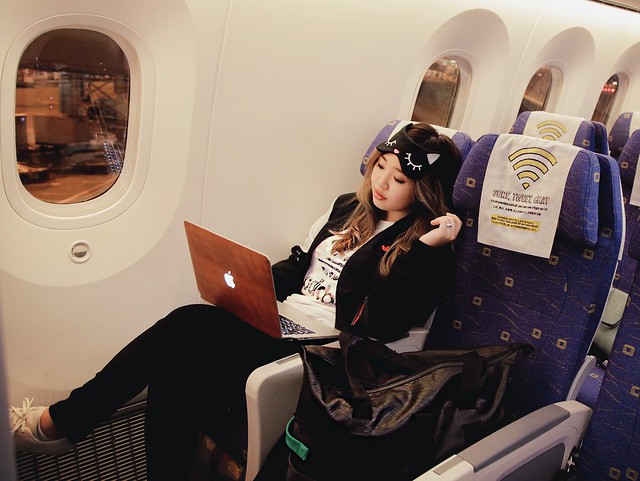Aloha guys!
It’s been a hot minute since I’ve done my last BSG, so I thought I’d ease into 2017 with a generic (read: non destination specific) one that all of you could potentially use and hopefully find useful. One thing that crops up quite a lot in my BSGs is seeing an influx of emails and questions from you guys asking if I can pen a 1. packing guide and 2. planning guide. As I am a messy human being, I don’t think anyone wants to see what my packing guide is like (ie. nonexistent, lots of hair pulling, stress crying), but as an accused OCD person (guilty as charged), I do think I’ll be more useful to everyone talking about the second option. Because lets face it guys – the key to saving money on anything, not just travel, is having a game plan. Spontaneity is great for tumblr overlay quotes, but if your bank account aint having none of that, then time to get over the hipster aesthetic and start getting down to planning your trip beforehand!
A couple of years ago when planning my own backpacking trip across Italy, I came across this lady’s travel planning website. Essentially, you told her how many people you had, what your budget was, and interests were, and then you paid her to plan your trip for you. I thought to myself, I could do that! And make a living out of it! But instead I wrote BSGs for free on my blog. Oh well. And ever since penning the BSG series (seriously, its getting out of hand, just look at the BSG sidebar), I’ve had a lot of friends come up to me and ask me to help them with their trip itinerary too. So I compiled the questions that I ask them that’s frequently the most useful things to know, and wrote them here for you guys:
PS. This is NOT an end-all guide. You’re meant to take these questions/points, fill them in for yourself before every trip, then base your itinerary off that!
The BSG Pre Trip Checklist
Generic
1. What are your key trip details?
Date/ Time/ Number of days/ Number of people on the trip/ Time of Arrival/ Time of Departure/
2. Is everyone on the trip on the same kind of budget/ financial capacity?
This may seem like an inane question because friendship should technically transcend all materialistic barriers etc etc etc. But I guarantee you, this will make a difference. Someone who’s earning 3k a month is going to want to do different things from someone earning 6k a month. Someone who is a broke student is going to be way more willing to hobo it out in a backpackers hostel than someone who’s a working adult and prioritises having a comfortable sleeping place. And neither option is wrong – you should be able to make the choices you want to make on a holiday you’re paying for. But it’s not great to stress each other out when this is happening – if 3/4 the people in the group want to go somewhere nice to eat and 1/4 doesn’t really want to spend that kind of money, you’re going to cause a lot of tension and resentment thats totally unnecessary. Just watch FRIENDS season 2 episode 5!
So there are a couple of ways to get around this. Firstly, and the most obvious – choose to travel with people who are similar to you in terms of budget. Secondly – if you’re in a group where the finances of each person is very varied, then either agree that it’s ok to split up at times, or make your trip budget clear to everyone in the group. And this goes the other way too – if you’re the well to do one in the group, then be considerate of the ones who aren’t as free with their finances. Or travel with people who are.
3. What’s the aim of the trip?
Do you want to experience things, like go hiking and surfing? Do you want to cafe hop? Do you want to shop? Are you the type that wants to instagram everything and therefore hunt down photogenic places? These are things you need to establish before going, because again, it’s going to be very frustrating if half the people in the group want to run off and shop and the other half want to shoot an OOTD at every corner. Again, this boils down to both understanding the travel style of people in your group, and also being considerate of what each individual wants.
Travel Specific

4. Are there any hidden costs you need to look out for when booking your plane ride?
Some airlines will charge you an extra fee at the gate if you don’t print your own boarding pass (ie. Ryanair). Some are ridiculously strict with baggage and will only allow ONE carry on – not one carry on + one handbag (ie. EasyJet). You should definitely google your airline before flying, just to be aware of what flight terms and conditions you should be looking out for. Travel forums are really handy here. And yes, this applies mainly to budget flights, but this is a budget guide after all 🙂
5. How long is your plane ride and what might you need?
Again, another budget flight specific point. You can fly budget to pretty far off destinations, like Japan, Korea, and even Greece. So you’re talking a good 7-8 hours in air. What might you need that you don’t want to pay for inflight? I always carry an onigiri in my bag so i can snack if I’m hungry instead of purchasing the oft ridiculously overpriced inflight meals. You can also bring in an empty water bottle and fill it up at the water dispensers after bag-check and before boarding, if you’re flying from Changi Airport. This varies from airport to airport, so again, google is your best friend here.
If you need in-flight wifi to do work on the plane, then check if your airline offers that before flying. This is not necessarily budget specific. Scoot, a budget carrier, does in flight wifi. Cathay, supposedly one of the world’s leading airlines, does not. Emirates offers you in flight data for a dollar. SQ offers it for about fourteen times that amount. So, check!
Either / Or
As a general rule, I find that changing money at your destination is cheaper. This goes against everything people advise online, but it is what has been true for me. So I like changing a little before I go so I won’t be stranded when I touchdown, then changing the rest there. However, this varies from country to country, so make your own decisions based on research before you go.
7. Cash or Card?
Logically, if you have a card that gives you interest free or no foreign conversion fee benefits, or a card that gives you great offline spending rebates, then carding more purchases might make sense. But you need to do your research as to which countries are more card/cash friendly. The US, for example, is very big on card culture. You card nearly everything. In Hong Kong, however, many places accept CASH ONLY. So my idiot american friends who met me in Hong Kong were wandering around the whole day with no money because they assumed you could just live on your credit card wherever you went.
And of course, as a general rule, always pay in the local currency on your card. Here’s an article explaining why.
For someone on a budget, however, what I would recommend is not bringing your card and only putting a certain amount of cash into your travel wallet for the day. Reason being, the minute you mentally commit to signing off on your purchases, you become so much more willing to buy frivolous things. But if you carry around the idea of your cash budget in your head all day, you’ll naturally spend less. When I was backpacking in Europe, I gave myself 100Euros cash per country, averaging 4 days each. Per country, mind you, not per day. And guess what? I stuck to it! Without much difficulty too, I should add. So it is possible, and I would definitely recommend this if you’re hoping to keep your total trip budget low.
8. Data card or Wifi Egg?
I must say from the get go that I absolutely hate roaming services. I have never been able to make sense of them, and they have traditionally always been more expensive than getting a new local sim. Sorry, Singtel! Even the 1GB/Month malaysian roaming plan for $10 which makes a lot of sense on paper is a headache, because IT IS A NIGHTMARE TO CANCEL and you get all kinds of administrative fees slapped on you for trying to cancel the AUTOMATICALLY RECURRING ROAMING PLAN. Headache!
Some countries you can get by with no data because theres wifi virtually everywhere. See: Korea. But this is just one of the things that i’ve come to terms with as a necessary luxury for me – now that I work, and so much of my work is online, I must get data whenever I travel. I’d rather spend the money and have access to my email, my text groups, my MAPS (very impt for me cos my sense of direction is nil) and my city guides (Yelp/Foursquare).
So which makes the most sense? I’d say this comes down to how many people you’re traveling with. If you’re solo, a data card probably makes the most sense from the local 7-11 or telco. But if you’re in a group, a wifi egg from your home country can prove very cost effective since you all split the cost of the egg and everyone can use it. You can also turn it on the minute you touch down even before you disembark, which I’ve always found to be very useful. Wifi eggs generally charge by the day, so do your math and figure out which makes the most sense for you!
9. Public Transport or Cab/Uber?
The obvious answer is public transport right?
Well, not always.
If you’re traveling in groups of 4 (or 5 for hongkong) then you might find that your cab fare per person might work out less than your train ride. Bangkok cabs for me have always been cheaper split than their trains, for example. In LA, some places can be really tough to get to unless you Uber it. And so your decision should be based on not just cost, but also time spent trying to get to a place. Because time is money, especially when you’re paying to be in a new place! Here are some bits and bobs you should know:
TO CHECK: whats the best way from airport to your accommodation?
In many places you might wanna cab, but in places like HK, Seoul, and Japan, the airport express trains are actually really efficient!TO CHECK: do trains run all night, and if not, what are their hours?
Trains in NYC are 24 hours, with frequencies slowed after a certain time. Trains in Tokyo and Hong Kong generally end at 1am. Trains in London run till midnight. This varies according to the lines on that train, but it’s good to know.) It’s important to know what the hours of public transport are, especially since you might have to factor in time to get home after your late dinner/drinks/show etc. In cities like Seoul, the trains stop at midnight, no matter where you are. So if you’re three stops from home when it stops, you’re just gonna have to get off and cab it.Countries never to take a flagged cab in: London, Japan, Australia
Countries where Uber > Cabs: London
Countries where Uber > Public Transport: Malaysia, Australia (some parts), LA
Countries where public transport makes the most sense: Hong Kong, New York, London, Seoul, Paris, Actually – most European cities.*Note: in HK, there is no midnight surcharge for cabs. It’s not ridiculously expensive to cab, but public transport is really affordable, so I would generally take that instead. Not a hard and fast rule, but just useful to know!
This seems like the entire point of the blogpost, yes, I know. But at the end of the day it really boils down to this. How much are you willing to put down on a trip? I am of the belief that you can always make your budget work for you as long as you’re willing to be flexible on certain things. Can’t afford to go to Paris? Don’t go. Always wanted to see Egypt but don’t have the cash right now? Save it for when you can afford it, and make a weekend getaway to somewhere within your budget. Want to do Bangkok on as cheap as possible? Easy. Eat street food, don’t go cafe hopping, don’t drink too much. Really want to do a trip anywhere on just three hundred bucks? Read my Budget guide to Phuket. (HAHA #selfpromo).
Obviously you’re going to be very depressed if you insist on going to Istanbul and you only have five hundred bucks in your bank account. For the record, if you have five hundred bucks in the bank, I highly recommend that you don’t go anywhere and focus on working hard and saving up instead because the hand to mouth lifestyle is only romantic in the movies you guys. But the point is, decide whats important to you, and understand that everything else is flexible. And it really helps to make a mental decision on how much you’re willing to spend on the entire trip, because it gives you a limit subconsciously and you won’t just be guesstimating at your total cost during the trip itself.
Alright guys, I hope that was helpful! Scrap that, it better be. Given how many of you have been asking for this post. Ha.
I’ll add to this as and when I think of something that will be relevant, but other than that, all the best with your trip planning, and may you all go places figuratively and literally in 2017 🙂
x
♥jem





